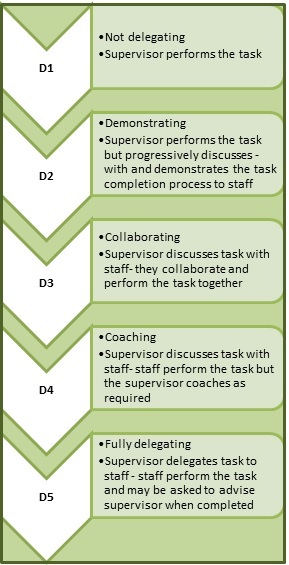Why delegate?
Supervisors get things done through other people. The ability to delegate is an essential supervisory skill. If supervisors try to do everything themselves:
- Their quality of work and quality of life may suffer
- Their staff may not be given adequate opportunity to develop
- Their organisation may suffer with burnt out supervisors and an inadequately skilled and transient workforce.
How to delegate?
 In your own mind, you should clearly define the task to be delegated:
In your own mind, you should clearly define the task to be delegated:
- Outcome, outputs or deliverables
- Importance and urgency (= priority)
- Timeframe and budget
- Risks and issues
- Skills required.
You should identify the staff member to whom the task is likely to be delegated and consider the following questions:
- Is it appropriate that this task be done at this level?
- Are they capable – skills and experience?
- Do they have spare capacity – current workload and availability?
- You should also take into account their development needs and perhaps their preferences.
You should then appropriately brief the staff member:
- Clearly define the task and personal development objectives
- Clearly define the framework within which the delegation is occurring (see graphic)
- Agree a suitable monitoring and reporting framework
Helpful hints
- Be reasonable to yourself and to your staff – do not delegate all the pleasant tasks – and do not delegate all the unpleasant tasks
- Be generous – delegate some of the tasks you enjoy and give yourself and your staff the opportunity to develop
- Be fair – delegate tasks to both the most capable and the least capable of your staff – give them all the opportunity to learn and grow
- Be understanding – recognise that staff may not do things exactly the same way that you do – they might even discover better ways of doing things
- Foster creativity – delegate the objective not the process – as much as possible, encourage staff to develop new and better ways of doing things
- Be trusting – as much as possible, allow staff to make their own decisions, and their own mistakes
- Be supportive – regularly check back with the staff you have delegated tasks to and make sure they are coping
- Be helpful – be available and accessible to help your staff complete the task
- Be flexible – different tasks and different staff will require different delegation techniques and different inputs from you
- Be patient – resist the temptation to take a task back that you have delegated – and only intervene if you must
- Be honest – if changes to the delegation are required, ensure that staff are clear about how it will change and why
- Be firm – remember that you have a job to do – expect staff to meet standards, deadlines and budgets
If you need help, when you’re ready to talk, we’re ready to listen – so contact the Hub!